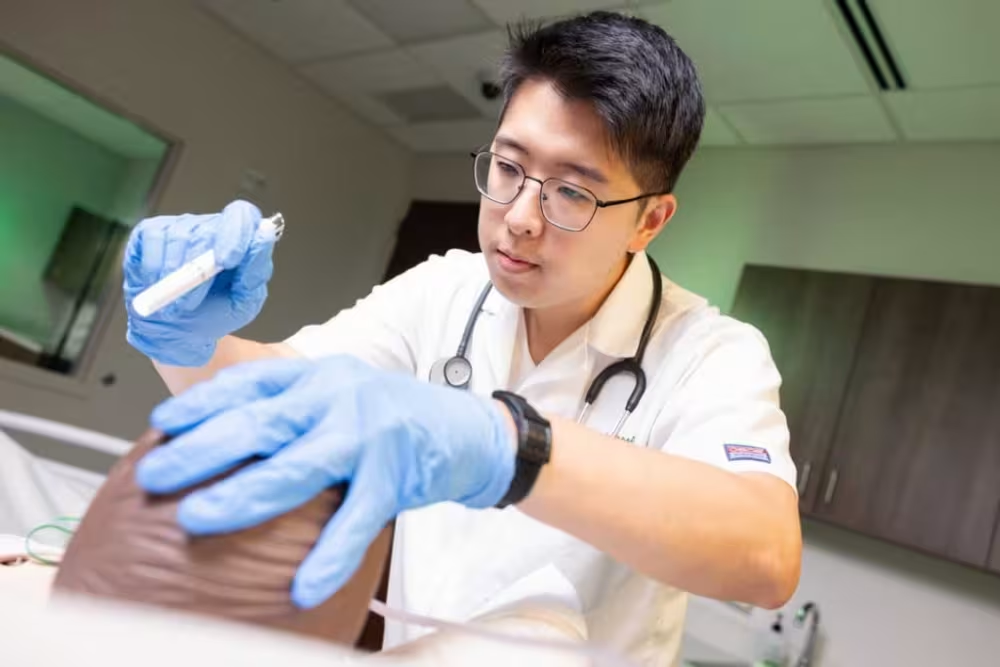How to Prepare for Nursing School: Top Tips to Hit the Ground Running
Each blog post is dated and contains accurate information as of that date. Certain information may have changed since the blog post publication date. If you would like to confirm the current accuracy of blog information, please visit our ABSN overview page or contact admissions at (844) 347-2497.
Learn how to prepare for nursing school by following these six tips: prepare your finances, create a support system, find relatable resources, develop healthy habits, meet remaining admission requirements, and take prerequisite courses seriously. You can meet each challenge and achieve your goals with the right preparation.

Nursing school, especially an accelerated program, can feel like a marathon. In a fast-paced, rigorous program, you must keep your focus and work hard. While this can sometimes feel intimidating, remember that you have the skills and the drive to reach the end and graduate.
Understanding how to prepare for nursing school is an important step in your nursing journey. At Felician University, we want to see you succeed. Our Hybrid and On-Ground Accelerated Bachelor of Science in Nursing (ABSN) program students are supported from admissions to graduation as they work toward earning a Bachelor of Science in Nursing (BSN) in as few as 16 months.
While preparing for nursing school, you’ll need to consider a few things, such as organizing your finances and creating a support system. Before exploring tips to help you prepare, it’s important to first learn what to expect.
How Does Nursing School Work? What You Need to Know to Prepare
In nursing school, you’ll learn how to treat patients and set them on a path toward healing and healthier lives. While every program’s curriculum is different, they share common ground in preparing students to become practice-ready nurses.
What is the hardest class in nursing school? The answer is different for everyone. Understanding what type of classes and coursework to expect from nursing school can help prepare you for challenges.
Felician’s Hybrid and On-Ground ABSN program combines nursing coursework, in-person labs, and clinical rotations. The curriculum is structured so each component builds on the other.

Fundamental Coursework
Often called the didactic part of nursing school, your ABSN coursework establishes the groundwork to build clinical judgment. These courses cover the fundamentals and theories of the nursing profession and set the stage for the hands-on skills you’ll develop during your nursing labs.
Your ABSN coursework at Felician can be completed online in our Hybrid Parsippany, New Jersey, program or in a classroom at our main campus in Rutherford, New Jersey. The hybrid ABSN program has three start dates a year in January, May, and September, whereas our On-Ground ABSN program has one, in September.

Learn more about how online nursing education works and how to pick the right hybrid program.
Nursing Skills Labs
Depending on your chosen program, your hands-on skills labs take place at either the ABSN learning site in Parsippany or the main campus in Rutherford. Featuring task trainers and full-body medical manikins, our lab environment provides a realistic backdrop for practicing basic psychomotor skills and procedures without the fear of risking patient safety.
You will learn to perform skills such as:
- Head-to-toe patient assessments
- Wound care
- Nasogastric intubation
Nursing Simulation Labs
Also taking place at your site location, nursing simulations are highly realistic learning exercises where you develop problem-solving, critical thinking, and clinical judgment skills across the patient care continuum.
Our simulation labs feature adult and child patient simulators that deliver realistic physiologic responses. Simulators perform the patient role in complex, high-risk scenarios requiring you and your classmates to treat them.
Every simulation is followed by a debriefing session, where you, your classmates and instructors will review the simulation’s successes and areas for improvement. These learning exercises provide a safe place to learn and grow. They will also help build your confidence, so you feel ready for clinical rotations.

Clinical Rotations
Your clinical rotations begin during your second semester in the program, where you will provide basic direct patient care while under close supervision. Initially, clinicals cover adult health and behavioral health. Then, as you progress in the program, you’ll encounter other areas, including pediatrics, maternity care, and public health.
Whether you’re a student in our Hybrid or On-Ground ABSN program, you’ll complete your clinicals within the Atlantic Health System and other leading healthcare providers across northern New Jersey.
Preparing for Nursing School: 6 Tips for Success
Whether accepted into a nursing program or considering applying, it’s natural to ask yourself, “How do I start preparing for nursing school?” No healthcare experience is required for Felician’s ABSN program, but there are ways you can start preparing to help smooth the transition to a nursing student.

1. Take Care of Your Finances
You will need a plan to finance your nursing education. You should explore scholarship and grant options, federal direct loans, and private education loans to cover tuition costs. When speaking with an admissions counselor, ask for our financial aid guide.
Tuition is not the only cost you must consider when enrolling in nursing school. Remember, there will be additional fees, health insurance, supplies, and general living costs that you must factor into your plan.
Your admissions counselor will also let you know what supplies to purchase. In addition to standard school supplies, you can expect to buy items such as a blood pressure cuff, stethoscope, and dressing scissors.
As you explore scholarship options, do not ignore small offers. While they will not cover full tuition, they can help offset these additional costs.
While nursing school is a financial investment, the benefits of a nursing career are worth it. In addition to pursuing a meaningful career, nurses experience opportunities for career growth, a strong job outlook and high earning potential.
Explore the many benefits of becoming a nurse and why nursing is a good career.

2. Build a Support System
When you’re in nursing school, “I can’t, I have to study,” will become part of your everyday vocabulary. Talking to your loved ones and telling them what to expect is an important part of preparing for nursing school. You may even want to recruit them to take items off your to-do list. A support system you can depend on can help you effectively cope with stress.
3. Find Relatable Resources
Unless they’ve previously walked in your shoes, it is hard for others to empathize with the effort you must put in as a nursing student. So, if you ever feel nervous or lack confidence, it helps to connect with others who’ve been there.
Talking with nursing students getting ready to graduate or working as registered nurses can do wonders for your self-esteem.
The National Student Nurses’ Association and other nursing organizations open to students, such as the American Nurses Association, can be great resources for nursing students seeking mentorship. While you won’t be able to become a member until you’re a student, it can be beneficial to research options ahead of time.

4. Build Healthy Habits
As an accelerated nursing student, your education should be your top priority; however, that’s not to say you should eat, sleep and breathe nursing school. You must take care of yourself, both mentally and physically. So, before school starts, evaluate your habits.
If you have good sleep and hygiene habits, you’ll want to keep that going in nursing school. If you have poor eating habits, you’ll want to seek healthier options to help you stay well during school. Just be sure to adopt new habits before you start nursing school, as it will be harder to stick to them with other responsibilities on your plate.
Additionally, taking time to do what recharges and relaxes you is critical to your success. When you fail to practice self-care, you put yourself at risk for burnout.
5. Complete Remaining Admission Requirements
Once accepted into a nursing program, you must complete a few additional requirements before enrolling. These include completing a background check, passing a drug screening, and earning additional certifications, such as CPR certification, if required.
Lastly, every nursing student must be current on their vaccinations. You need to be immunized before you can enter any clinical setting. Ask your admissions counselor about additional admission requirements as soon as possible, so you have enough time to meet these requirements before your start date.

6. Take Prerequisites Seriously
Prerequisite courses ensure that all students entering an accelerated nursing program have a solid foundation in science, math, and general education. They are instrumental in preparing you for advanced nursing courses. It’s essential to take these courses seriously and try your best.
They are an important step in the admissions process and can help show you how to prepare for nursing school. If it’s been a few years since college, prerequisites can help you reacquaint yourself with college-level courses and help you set productive study habits.
The number of prerequisite courses you must complete depends on your college experience. Your admissions counselor will review your transcripts to identify which courses transfer and help create an academic plan for you to complete the remaining prerequisites in time for your target start date.
Ready to Apply to Nursing School?
Knowing how to prepare for nursing school is the first step toward becoming a nurse. With proper preparation, you’re ready for the next step: applying to a nursing program.
Felician’s 16-month ABSN program offers two course delivery options: a Hybrid program in Parsippany, NJ, that combines online learning with in-person labs and clinicals and an entirely On-Ground program at our main Rutherford, NJ, campus that trades out online courses for in-person, classroom learning.
If you have a non-nursing bachelor’s degree or a minimum of 60 college credits, you may be eligible for the ABSN program. Contact our admissions team today to learn more about the program and if it’s right for you.
